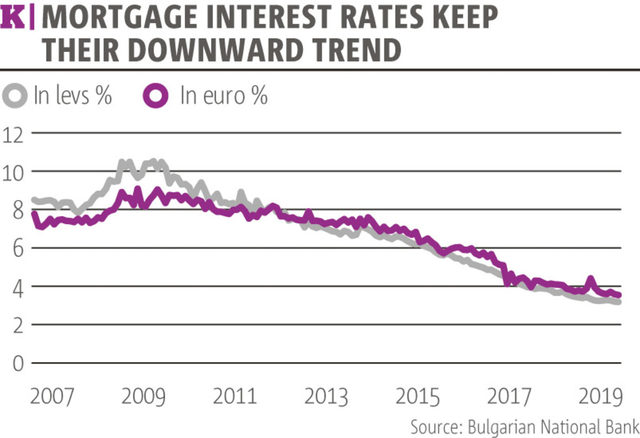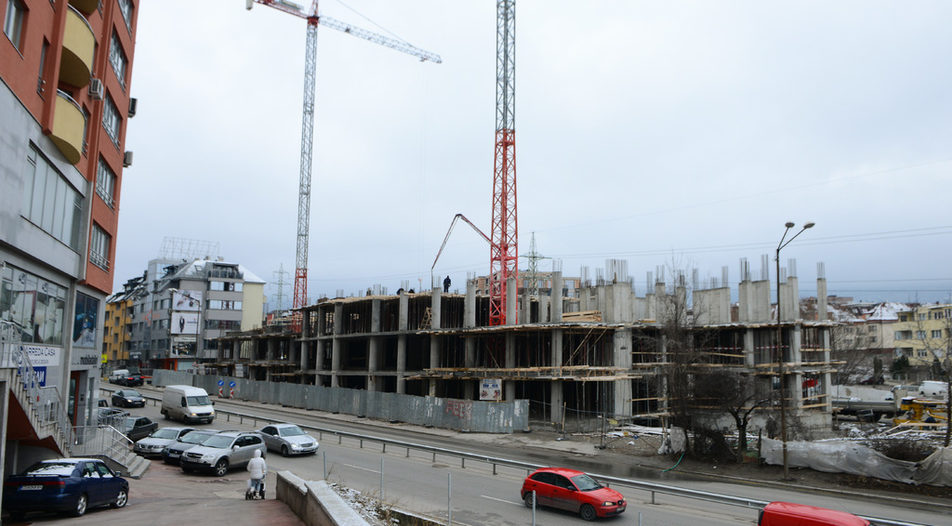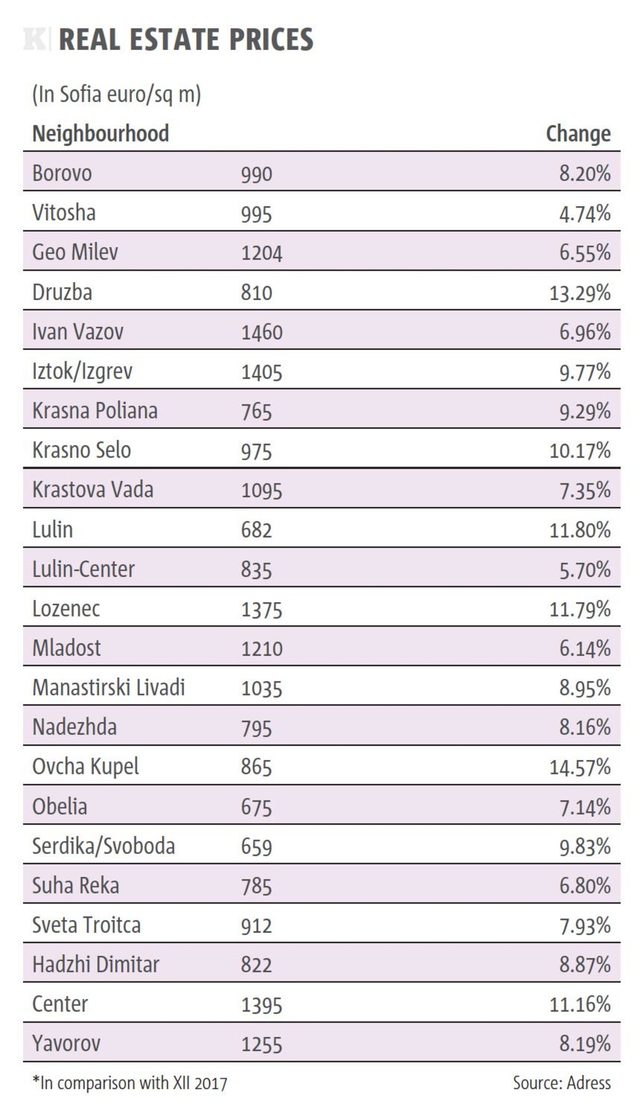After yet another strong year, the residential real estate market in Sofia is headed for a standstill. The first symptoms appeared at the end of last year - deals taking longer to complete, fewer mortgages, a huge number of buildings under construction... This does not automatically mean a drop in prices, but most forecasts point to stabilization.
More affordable buys
In spite of the rise in the price of residential property (8.8% per year according to Address, 9.5% according to Imoteka, 4% according to Bulgarian Properties), real estate agencies report that the purchase of home became more affordable in 2018. The indicator is calculated as the ratio between the price per square meter and the average salary in the city, which in Sofia has seen a 20% increase over the past two years.
Address agency has calculated that if a family with two employed individuals with average Sofia salaries (775 euro) bought a three-bedroom apartment in 2018 for 121 000 euro in the Mladost district, of which 25 000 were a down payment and the remainder a credit, it would need to put aside 532 euro per month, or 35% of its joint income, to repay the loan in 20 years. Two years earlier the payment to the bank would have been 511 euro (the price per square meter was lower at 1054 euro, but the interest was higher). In 2016 the loan consumed 40% of the family's income.
According to Bulgarian Properties, 1.4 monthly salaries were necessary to buy one square meter of property in Sofia in 2018. This means the property is currently twice as affordable as in 2008 when it took 3.5 monthly salaries to buy a square meter.
More investor buyers
Typical buyers are young families with an infant child who look for a two-bedroom apartment of about 80 to a 100 square meters for a price of 100 000 to 120 000 euro and have savings between 50 000 and 80 000 euro. Their address: a neighbourhood with good infrastructure and public transit, close to a park or school. Imoteka reports that this was the profile of the classic real estate client from Sofia in 2018.
Another type of buyer purchased the property for investment purposes and that accounted for about 20% of total sales. The upper-end segment represented 33% of the market in 2018. These were properties with prices above 145 000 euro and houses in the southern districts and the approaches to the Vitosha mountain that cost over 250 000 euro.
Address´s calculation reveals that the hike in property prices is triple the average inflation, interest on bank deposits are close to zero, and investment in property in a big city in Bulgaria generates a return of about 4-5% per year.
Jump above 100 000 euro
Not too long ago a property valued at more than 100 000 euro was perceived as expensive, but Imoteka comment that this psychological barrier was transcended in 2018. In the past year, deals exceeding that price jumped by 35% in Sofia. Address´s data confirms that the share of these deals in the total number rose from 21 to 30%, mostly in the 100 000 to 150 000 euro range.
Nevertheless, the most frequent deals were in the 50 000 to 70 000 euro span, but in 2018 their share dropped seven points to 18%.
Purchases over 145 000 euro fell in the upper-middle to the upper range and Colliers, who follow this segment, confirms that it is growing strongly even though it still represents a smaller percentage of the total.
Bulgarian Properties noted the tendency to search for smaller flats because of increased prices, which in turn drives up demand for one-bedroom apartments. Their observations show that the psychological barrier of 1090 euro per square meter for a residence in Sofia has yet to be overcome.
Mostly on credit
Low-interest rates on loans have swelled the number of clients taking advantage of bank financing by 50% in 2017 and 60% in 2018, Colliers said. Imoteka also noted that credit line payments have increased by 9 points to reach 53% of all deals. Another tendency spotted by Address is that borrowers rely on bigger bank participation and apply for larger loans. According to their information, about 12% of all deals involving bank financing are 100% on credit. Imoteka has registered that about one-fifth of loan-financed purchases have 80-90% bank participation.
However, for the first time since 2013, Address recorded a decrease in financed deals. According to the Registry Agency, the number of newly granted mortgages in Sofia has dropped by 16.7%. Realtors from Address see that as a sign of a slowing market. Their hypothesis is that the continuation of this trend into the first half of 2019 would lead to a reduction in the number of deals and from there to a price correction, according to the agency´s managing director Gergana Tenekеdzhieva.
Deals are slower
Clients no longer buy a home after only two weeks of viewings. Imoteka commented that buyers evaluate the market carefully, do research and try to cut down on prices. Still, most prospective buyers want to purchase a home in 15 days, but their share has dropped 5 points to 35% over the past year. After growing 7 points and reaching 28%, the second largest group are those who need one to three months. Of Address's clients, a little above 35% finalize the deal in less than 15 days, while those who took between two weeks and a month grew from 20 to 24% in 2018.
One possible explanation for the slowdown is that buyers need more time because of the increased availability of choices among pre-construction, during construction and completed residences. Another reason is the discrepancy between the clients' and sellers' price expectations. Deals concluded after a price renegotiation constituted 55% of all sales at Address in 2018. Discounts varied from 2 to 10% of the total value and the largest share of them, about 30%, was in the range between 1000 and 5000 euro.
Imoteka´s statistics are similar, with nearly 60% of purchase prices renegotiated. Over 10% of the deals happened at a discount of more than 10 000 euro. In this the agency identified a pattern: the owners initially inflate the price but then reconsider and are ready for concessions in order to sell. In the upper-middle and upper segments the spread between ask and sell prices was down to 2% in 2018 (compared to 11% in 2013) and Colliers attribute that to the great demand and limited supply.
Stabilizing year
"The past year could be characterized as stabilizing for the real estate market in Sofia," said Polina Stoykova, managing director of Bulgarian Properties. "Probably for the first time in modern history, we have a dynamic market with very gradual increases on all counts. Up to now, it has always developed sporadically," she added.
After the middle of 2018 the market has gradually slowed and decision time has increased, realtors from Address confirm. "The abundance of buyers of 2016/17 has decreased, removing the sellers from their dominant market position," said Gergana Tenekedzhieva.
According to Imoteka, finished deals increased by 7-8% last year. Colliers reports that the upper-middle and upper segment has grown by an average of 25%. "Our activity increased throughout the year, but there are contradictory signals about future tendencies. Data from the Registry Agency shows an identical number of deals in 2017 and 2018 and even a drop during the traditionally busy fourth trimester," representatives from Imoteka commented. For them, a possible explanation lies in the higher number of pre-construction deals which are yet to be registered.
Building at full steam
Sofia requires about 12 000 to 15 000 new residences per year, according to the national association of builders and contractors, who also complained that bureaucracy slows down their operations. Address´s data shows that 14 761 building permits were issued in 2018, a 69% increase in 2017, when the permits issued were 33% more than in 2016. Construction permits are probably the only indicator that has reached the levels of the boom of 2007-2008, commented the managing director of Bulgarian Properties.
Colliers´s assessment is that by the end of 2018, completed projects in the upper-middle and upper segment have increased 8% in respect to the first half of the year.
"The market´s impetus has slowed and together with the negative demographics it will gradually lead to the 'sobering up' of those wanting to sell," the Address agency predicted.
Frozen prices
Realtors expect a stable market and the first quarter of 2019 saw only 4% growth of real estate prices in Sofia on an annual basis in comparison with 2018. Demand continues to be strong, but supply is ramping up, gradually saturating the market. It is still early to talk about a drop, but it´s probable that in 2019, or at the beginning of 2020, we will see a period when prices will freeze. If there is a drop at this stage, it will be small and occur only for certain types of property and areas, said Lyuba Atanasova, managing director of Imoteka. "Prices may see small fluctuations, but will remain at these levels for the next 1 or 2 years," believes Polina Stoykova from Bulgarian Properties.
Price variations will to a large extent depend on new construction and new projects. Lyuba Atanasova thinks that the balancing of supply and demand, the expected hike of interest rates from mid-2019, the slowing of the Eurozone's economy and the large volume of new construction projects will lead to a drop in activity and maybe even a small fall in prices in the second half of the year. Colliers commented that if interest rates increase as expected, a gradual decrease in property purchases for investment purposes is possible. For now though (see graphs), the mortgage interest rates continue their downward movement. As a whole, realtors expect a calm market.

After yet another strong year, the residential real estate market in Sofia is headed for a standstill. The first symptoms appeared at the end of last year - deals taking longer to complete, fewer mortgages, a huge number of buildings under construction... This does not automatically mean a drop in prices, but most forecasts point to stabilization.













